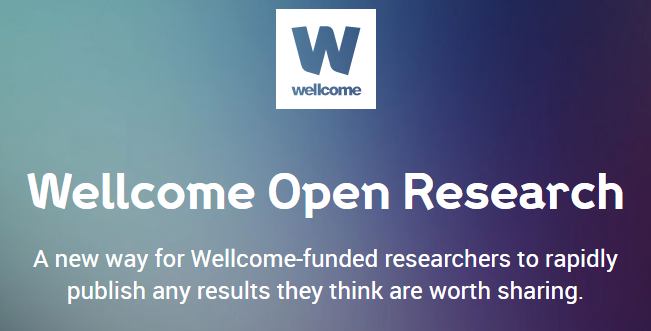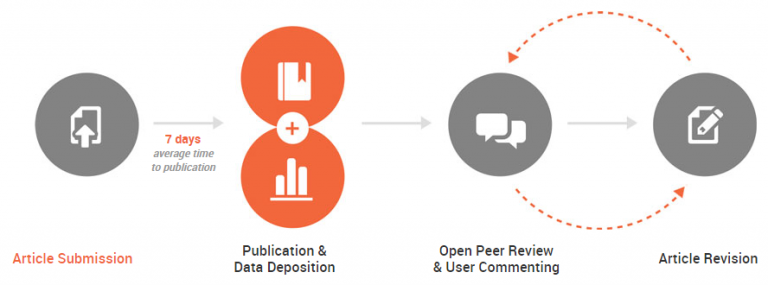Wellcome Open Research: the start of a new journey
Posted on 16 November 2016
Wellcome Open Research: the start of a new journey
 By Rebecca Lawrence, Managing Director at F1000
By Rebecca Lawrence, Managing Director at F1000
This blog was first published on the F1000Research blog on 15th November 2016
The first articles have gone live on Wellcome Open Research today; 15 of them in total, with more submissions in the pipeline. The breadth of articles received so far starts to show just how broad these outputs can and should be (not just traditional narrative research articles). It also shows benefits of using such a platform for researchers across career stages, from those just starting out to more experienced and tenured researchers. This is a fantastic start!
Wellcome Open Research uses the publishing model we have developed and run for almost four years on F1000Research, namely immediate publication with mandatory inclusion of the supporting data, followed by transparent invited peer review, complete with full versioning.
This platform fundamentally changes the relationship between the different parties involved in research to support collaboration, openness, and rapid access to findings and data. In this approach, the funder Wellcome is formally the ‘publisher’ i.e. the owner of the platform; F1000 is the contracted service provider who provides the technology and runs the service on behalf of the funder for the authors, referees and readers. And the authors are those working on projects that are in receipt of some form of funding from Wellcome.
The platform creates a much closer partnership between these players to help enable the start of necessary changes to the incentive structures for research and researchers as highlighted in the recent Amsterdam Call for Action on Open Science and elsewhere.
What are the benefits?
This platform will significantly speed up the process of sharing new findings and enable researchers to publish any outputs from the funding they have received without having to persuade journal editors that the work is worthy of publication in a particular journal. This should significantly reduce research waste as the barrier for publishing smaller, confirmatory or negative/null findings is removed, and should enable funders and the public to see more of the research that they fund.
Furthermore, because the transparent peer review process is after publication, the referees are purely working to help the authors improve the work and provide readers with relevant context. This model should improve both research integrity and potentially reproducibility as researchers are under less pressure to overstate findings or to cherry-pick the ‘best’ results for reporting.

This approach can also start to change the way research and researchers are subsequently evaluated. Evaluation will be solely at the article level, focussing on the quality of the work, not where it has been published. It can help funding agencies and institutions that signed up to the DORA Principles to overcome the practical challenges they have found in implementing those principles and open up opportunities to rethink practices.
For example, there are a whole raft of existing largely quantitative article-based measures that can provide valuable information at an article-level, such as citations, the NIH’s RCR measure (Relative Citation Ratio), downloads, views, altmetrics etc. Meanwhile, transparent refereeing creates opportunities for new qualitative measures to be developed as they can form their own auditable evaluation of a piece of work. Other qualitative measures also exist such as F1000Prime, which uses a prestigious Faculty of ~8,000 leading biomedical experts to recommend published articles that they think are especially interesting or important, regardless of venue of publication. Used appropriately and in combination, these measures can provide useful indicators about the research, as well as its use and reuse.
Why create a funder platform?
We believe that funders and research institutions are key to incentivising a shift from the current cycle that traps researchers in trying to publish in ‘top’ journals to get recognition for their work. This system delays the sharing of new findings and means much science is never published at all.
I have written before about the EU Open Science Agenda and how funders are key to incentivising open science. Researchers need reassurance that if they publish outside of the existing journal-based system, funders and institutions will ‘count’ those publications towards their next grant or job application and a funder-based citation can provide such reassurance whilst we are going through this transition period. We expect that in time, other funders and research institutions will also start to offer their researchers such platforms and that, ultimately, these platforms will merge into a single international platform, open to all researchers.
The future vision
We anticipate that this journey may follow a similar path to the early stages of Open Access, of which of course Wellcome was among the first to endorse. Funders may gradually move towards a much stronger position in ultimately requiring those who receive their grant money to publish the outputs of that funding in more rapid and open ways.
Although such a journey will clearly impact the role that publishers play in this ecosystem, many of the core skills and knowledge that publishers have developed are required in this changing landscape. As the environment becomes more open and collaborative, we believe publishers can work increasingly as service providers to researchers, institutions and funders, offering their technologies and skills in managing editorial processes and in preservation, and providing strong customer service in enabling the dissemination of new research findings.
We ultimately hope that such a journey will trigger a seismic shift in how new findings of all types are transmitted, creating a more collaborative approach to assessing those findings, and a fairer system for evaluating research and researchers for future jobs and grants.
F1000Research is an original open science publishing platform for life scientists that offers immediate open access publication, transparent post-publication peer review by invited referees, and full data deposition and sharing. F1000Research accepts all scientifically sound articles, including single findings, case reports, protocols, replications, null/negative results, and more traditional articles.
